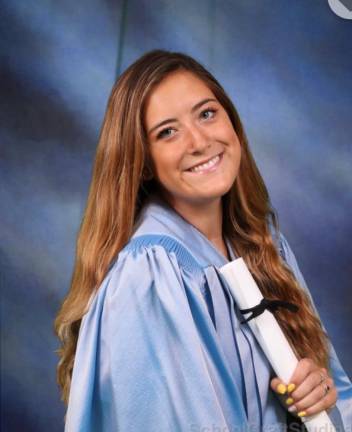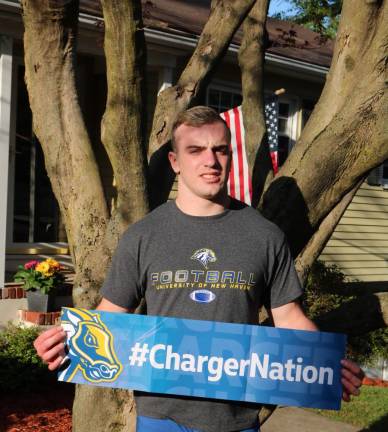Roll with it 101: College-bound seniors ponder their future
College. The perennial question of whether college is worth the hefty tuition is getting a much harder look now. For college-bound seniors, there are lots of question marks – but plenty of excitement, too.






Isabella Sergent, a senior at Sparta High School, already has her roommate picked out and knows where she’ll be dorming when she heads to Santa Clara University to study political science with a minor in marketing.
“I’ve always been that weirdo,” she laughed. “In middle school I was like, I can’t wait to go to college! I’m just excited about meeting new people, you know? It’s a new adventure, on my own. It’ll be a little scary without my parents, but I think they prepared me well.”
Santa Clara is planning to bring its undergrads to campus for the fall, then send them back home in November to finish the year online, and do the opposite with its upper-classmen. The Jesuit school plans to offer “hybrid” instruction, its website explains, with teaching delivered in some combination of online and in-person. Was it still worth the price of full tuition – about $53,000 a year – if she’d only be going half the year? Would she get money back for the half-year she was not on campus? Should she defer, and do her freshman year at community college?
For college-bound seniors like Sergent, who thought they had put one of the biggest decisions of their young lives behind them when they committed to college, the questions just keep coming.
“I was thinking of maybe even community college here, but we don’t even know if community colleges are going to be open here in the fall, if they’re not open in California, so what’s the point?” she said. Her plan is to go out to California for the full academic year, living on campus when it’s open and living with her grandparents the rest of the time.
“Of course I was looking for, like, the normal freshman year, full year,” said Sergent. “But it’s better than nothing. I was really looking forward to going out to California, and I still am. Even if it’s shortened, it’s better than nothing.”
The college experience
Kelly Brower, whose daughter Laurel Brower was accepted to Rutgers to major in performing arts, is asking herself exactly that question. Laurel, a senior at Delaware Valley High School in Milford, Pa., been acting since she was 10, and last year had a big part in an off-Broadway show at Manhattan Repertory Theater.
“She’s got other interests, too, so we’ll see what doors college opens for her,” said Brower. “I want her to have that full college experience. I had it, it was awesome, and I encourage it for both my kids. Because yes, the education is great, but the whole experience is really educational as well.” Rutgers has yet to announce its plan for the fall.
“And I feel like if they’re not going to open, why would I pay for her to go to a college like Rutgers to do online classes?” said Brower. She’s not against the decision to stay closed, if that’s the right decision. But the perennial question of whether college is worth the hefty tuition is getting a much harder look now. “She won’t be doing the activities, she won’t be with a roommate,” Brower said. “She won’t have that experience of being on her own.”
If it turns out they’re going virtual, “How is that tuition cost worth online classes?” asked Brower. Rutgers costs about $29,000 a year for out-of-state undergraduates. “Right off the bat, without knowing more info, I just don’t see it being worth it. You can get a third of the price, taking those necessary classes at a community college, or an in-state college for that matter.”
Still in the dark
Bill King has come to the same conclusion. His daughter, Catherine King, a senior at Warwick Valley High School, is either headed to SUNY Cobleskill to study food science, or, if classes are going to be online, to Orange County Community College.
SUNY Cobleskill College of Agriculture and Technology is the first choice for Catherine. She came home one day in eighth grade and announced out of the blue that she wanted to be in the Future Farmers of America. She has been FFA chapter president for the past two years.
But if she’s not going to have the immersive experience of learning in the same room as a professor and classmates, well, community college is “much, much cheaper,” said King. “As a dad, I really don’t want to see her enrolled into a college and have everything done online. If they’re going to do that, then I’d rather have her go to a community college and take some of the basic courses, get them out of the way. And then when everything clears up and gets behind us, she’ll enroll and go away and stay at the school.”
Some schools have announced that they are forging ahead with in-person campus life, tentatively. Joey Heisler, a West Milford High School senior, is headed to the University of New Haven, where he’ll be studying criminal justice and playing football. “The latest we’ve gotten, ‘cause they’re in Connecticut, they plan on moving students in on August 24,” said Linda Mosley-Heisler, his mom. “God I’m hoping.” Welcoming students to campus is the third phase of the university’s three-phase re-opening plan, each contingent on the success of the previous steps. Phase 1 begins June 1 with the re-opening of campus labs.
Heisler is captain of his high school varsity football and lacrosse teams. This year’s lacrosse team was looking really good, he said, with a shot of competing for the conference title, before the season was canceled. He took a break from mowing his neighbor’s lawn to jump on the call.
“A lot of my friends, they don’t know what their schools are doing yet, so most of them are still in the dark,” he said. Heisler has been hitting his in-home gym, preparing for the season ahead. “I’m not concerned because I know the university, if they felt it wasn’t safe, they wouldn’t be putting me out there,” he said. “They wouldn’t be having in-person classes or having us play football. So if they feel it’s safe for us, then I have no concerns.”
Keep them close
Mosley-Heisler has always valued knowing that her kids were not too far away. Her older daughter is also at the University of New Haven, a rising senior whose spring break turned permanent this year. “It’s nice, they’re far enough away to enjoy college, but close enough in case something happens, which was why I always said, you can’t go across country,” said Mosley-Heisler. “This was my rule. You have a three-hour driving radius. In case something, God forbid, happens, and we need to get to you or you need to get home.” That eventuality felt much closer to reality this year, and being in driving range made it easy for her daughter to go pick up the belongings she’d left behind at school, when it became clear that spring semester was going fully virtual.
For many families, a college’s proximity to home has taken on new significance since the pandemic. “When this all started happening, kids who were comfortable being halfway across the country from their families or even all the way across the country from their families started rethinking those considerations and pulling in a little bit closer,” said Lillian, of College Mode, “and made their final decision based on the experience of having things shut down like that. You know, where do you want to be when something like that happens?”
And if students do get sent home mid-semester, parents particularly would like to know: will the school refund room and board? Some schools have sent out pro-rated refunds for room and board for this spring. Others have not.
Small is beautiful
Qualities like small class sizes and significant acreage, too, are being touted anew by colleges as they figure out how to keep students on campus safely.
Kate Burns, whose daughter Renee Burns is headed to Monmouth University to study accounting, likes the school’s small student population and relatively large footprint. Kate is not personally worried about the virus, she said. “The age category of the college kids is not really the age group that’s being affected,” she said, “and I also work in the medical devices industry, so I’m very confident in the biologics and the therapeutics that are being developed.” Still, she’s pleased that with only about 4,300 undergrads on Monmouth’s 170-acre campus, “there is room to spread out there,” she said. “At Penn State or Rutgers,” with about 40,000 and 36,000 undergraduates, respectively, “it’s a different story.”
Renee, who is captain of the dance team at West Milford High School, was taking a virtual dance class offered by Monmouth while Kate was being interviewed. In the department of silver linings, this strange final semester may provide a way for high school students, many of whom have been scheduled to the teeth all their lives, to gradually adjust to a more self-directed lifestyle. “She’s gaining insight into time management,” said Burns. “Right now she’s getting up at 7 a.m., she’s taking a look at her school work, she’s getting in either a run or a hike or a virtual dance class.”
Kate is optimistic that the freshmen will move into Monmouth as planned in September, but “when you’re looking at a four-year experience, if you have to lose three months then, you know, it is what it is,” Burns said. “You have to roll with it, and that’s my daughter, too, she rolls with it.”
Hailey Minter, a senior at Vernon Township High School, has a good idea of what she wants and how to get there. “I’m looking into either going into pharmaceutical sales or possibly going to law school post undergrad,” she said. She’s headed to LaSalle University in Philadelphia to major in international business. “As of now they are pretty sure we will be there in the fall,” she said. But thanks to a pair of scholarships, whether classes turn out to be online or in-person or somewhere in between, she will be attending, “which is a really big relief off my shoulders.”
Minter got into LaSalle’s Business Scholars Co-Op program, which placed 100 percent of its 2019 class into full-time job offers or graduate school. She has already bonded, virtually, with the dean of the business school. “She’s awesome, she’s an open book,” Minter said.
“As every person, I have my fears” about heading out into the world in the midst of a pandemic,” said Minter, “but I’ve really learned that I can’t live my life in fear. So I just kind of have to go with the flow. I feel like I’m so fortunate to have grown up in such a beautiful place as Sussex County, but there’s only so much you can learn here. I’m really excited to take in the diversity of the city and get to explore that, and get to meet new people and just really broaden my horizons.”
Editor’s note: This story has been updated to correct the spelling of the name of Isabella Sergent.
“I’ve always been that weirdo. In middle school I was like, I can’t wait to go to college! I’m just excited about meeting new people, you know? It’s a new adventure, on my own.” Isabella Sergent, Sparta High School senior